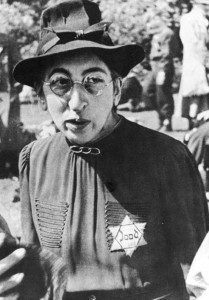Chapter 14 discusses that some Jews headed into the “unknown”, which was underground in Berlin. Going underground during wartime was a huge risk for Jews because if they were caught without paperwork, then they were certainly headed to at least hard labor and most likely to death. By going underground, Jews were breaking the law, which means that they would certainly be tortured for committing a serious offense.

In order to go underground, Jews would have to remove the Judenstern and to discard their paperwork. Jews would have to lie, cheat, and steal their way to survival. However, it was not an easy decision to head into the “unknown”. Many Jews were wedded to following the law and believed in maintaining order within the Third Reich. Since these Jews did not go underground, they would be forced to relocate to some other area within the Reich, whether it be a concentration camp or simply deported from Germany.
Another important factor for Jews was to leave behind their past. Jews were forced to give up their homes and businesses for the war effort, so in essence, a piece of their past was already gone. Jews would have to avoid former neighbors and friends due to a fear of being turned in for arrest by the Gestapo or SS. By going underground, those Jews were giving up on their loved ones in order to fight for their own survival. About ten to twelve thousand Jews went underground during WWII.
Over the course of the war, many Berliners were afraid of the unknown, whether they were ordinary Aryans or Jews or Gypsies. This unknown could have come in the form of air raid bombings or being captured by the Gestapo or SS. Many Berliners were afraid of the unknown, and they had good reason to fear it. Crime ran wild throughout Berlin and the Third Reich, so ordinary citizens had to be careful with every move they made. For an example, I will re-mention the S-Bahn murderer, who committed more than two dozen crimes during the war years. The unknown could come in the form of darkness of traveling at night due to the blackouts that was carried out in the Third Reich. In closing, Berlin at War continuously brings up this concept of the “unknown”, which I believe can take many forms, such as what actually occurred in the concentration camps as illustrated by Moorhouse, the ever-lasting blackouts at nighttime, and whether or not to go underground to try to escape from the grasp of the Gestapo/SS.
